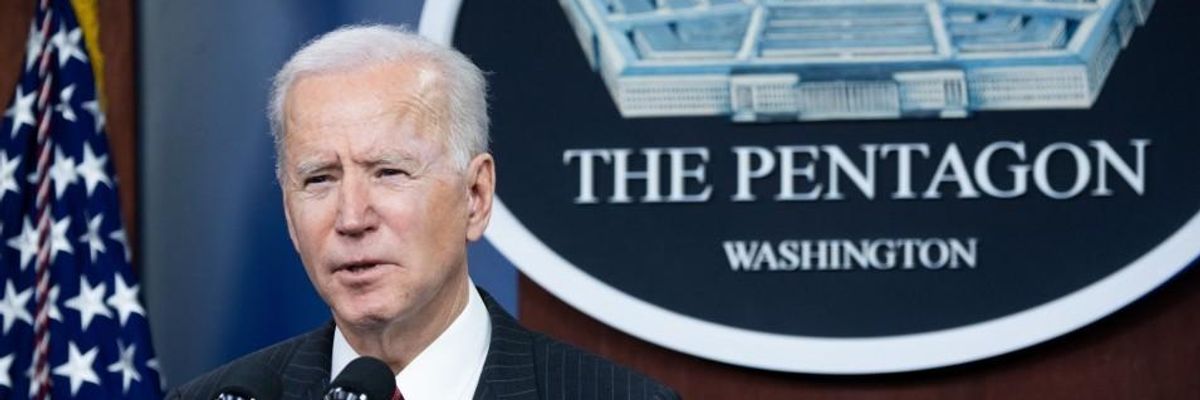Members of Congress must "stem the tide of exorbitant military spending" by backing two amendments to the annual defense bill that would cut the Pentagon budget.
That was the message delivered to lawmakers Tuesday in a letter (pdf) from a diverse collection of 49 organizations including Demand Progress, Greenpeace USA, Public Citizen, and Veterans for Peace.
The groups' letter followed the House Armed Services Committee's September 1 vote in favor of a $23.9 billion increase in military spending--an amount on top of President Joe Biden's proposed $753 billion for fiscal year 2022. Biden's proposal is already up from the $740 billion in the previous fiscal year under the Trump administration.
The demand was delivered as the annual defense bill, the National Defense Authorization Act (NDAA), is being debated on the House floor, where amendments--as of Wednesday--were still being considered.
Among them is a proposal, Amendment 40, from Rep. Mark Pocan (D-Wis.) to cut the overall spending authorization level by 10%, exempting military personnel, the Defense Department federal civilian workforce, and related health program accounts. Amendment 41 led by Rep. Barbara Lee (D-Calif.) would limit the amount of military spending to that requested by the president, thus eliminating the proposed $23.9 billion spending boost.
Both those amendments deserve a 'yes' vote, the groups said, because "pouring billions more into the military, far beyond even the level requested by President Biden, sends exactly the wrong message at this moment in history."
"We are struggling to end a deadly pandemic, deal with the looming climate crisis, confront racial injustice, and secure badly-needed relief for working people all over the country"--problems, the groups wrote, "that no amount of military spending could ever solve."
"Yet we are consistently told that resources are finite and asked how we will pay for efforts to address these challenges even as there always appears to be plenty of money to buy new and unnecessary weapons and fill the pockets of weapons contractors," the letter added.
The letter came a week after an analysis found that as much as half of the estimated $14 trillion that the Pentagon has spent since the U.S. invasion of Afghanistan two decades ago has gone to private military contractors like Lockheed Martin and Boeing.
Lee and Pocan, in a letter sent to House Armed Services Committee Chair Adam Smith last month, argued that reduced Pentagon spending in the NDAA was an imperative, especially in light of the ongoing Covid-19 pandemic and the global climate emergency.
"Covid-19 remains the greatest threat to our country and the world, yet only a small percentage is vaccinated against this deadly disease. Climate change is destroying neighborhoods in the blink of an eye. We should be fighting these very real threats," Lee and Pocan wrote, "instead of authorizing more than what was requested to fund the slush funds of defense contractors."

